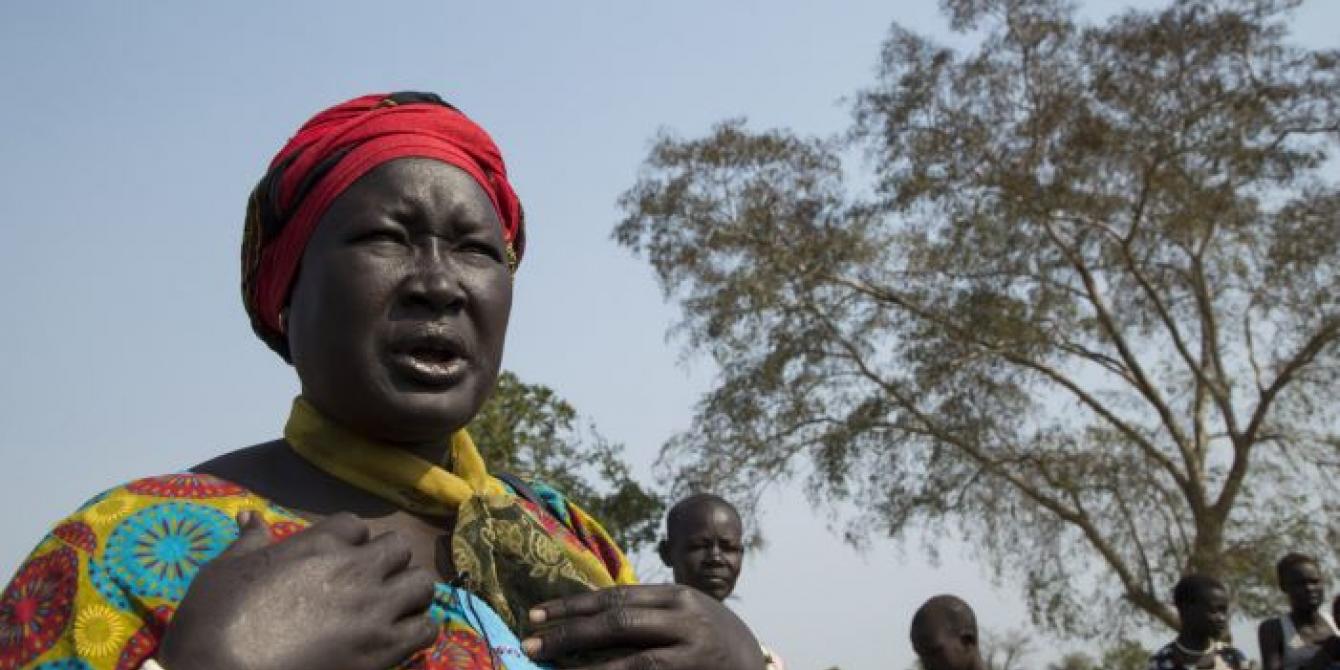
Photo: Rebecca is an entrepreneur who owns a vegetable farm in South Sudan. Credit: Bullen Chol/Oxfam.
South Sudanese women demand for a rightful representation of at least 35% in government
January 30th, 2020
Juba, South Sudan
In three weeks’ time, after two extensions, South Sudanese parties to the conflict are due to come together to form a unity government. After years of violence, we hope that this milestone will move us closer to securing sustainable peace.
It is past time: the people of South Sudan are tired. Tired of violence, of running, of hunger, of children being denied the future they deserve.
We were born in South Sudan and know what it feels like to grow up amidst endless gunshots, amidst brutality. We know the fear of being forced to leave our homes and the pain of being separated from loved ones. And as South Sudanese women, we know the constant fear of becoming one of the women and girls abused by armed men. As South Sudanese women, we have grieved our sisters whose rights have been denied as the war raged on.
As we approach this milestone, conflict is not the only challenge our country must tackle. We must address the battles that South Sudanese women have to constantly face, even after the guns are silenced.
These battles start in our childhood. South Sudan is one of the toughest places in the world to be a girl. Up to73% of girls in South Sudan are missing out on education, and over half are married before the age of 18. According to UNICEF, an adolescent girl in South Sudan is three times more likely to die in childbirth than to complete primary school.
As our country looks to the future, it’s time for change.
Women and girls are Born to Lead
In August 2019, we joined forces with other South Sudanese women’s rights activists to launch #BorntoLead. This is a platform where we can join forces as we continue to fight harmful norms that tell us that we do not have equal rights and should not have equal opportunities.
More importantly, the #BorntoLead campaign showcases what is often under-recognized: that despite incredible challenges, South Sudanese women are contributing to positive change in their communities every day. Together, we are pushing for a future where women’s leadership is celebrated, and where all South Sudanese women and girls have the power to influence the decisions that affect their future.
The revitalized peace agreement includes a 35% quota for women’s representation in government. This must be fulfilled. Our leaders must take action to create a political environment that is welcoming and empowering for our women.
Yet to date, the quota has been largely ignored. As the formation of the unity government looms and as nominations for political parties are currently being made, we are calling on our leaders to publicly re-commit to meeting the threshold in all their individual party appointments.
In truth, this demand in not really about ‘the 35%’. It’s broader than just participation at the highest levels. We dream of a South Sudan where women are represented and can meaningfully participate in decision-making processes at all levels – from the grassroot level, up.
Women waging peace
‘Where were the women?’; ‘women did not go to the bush to fight’; ‘there are no qualified women’; ‘women cannot lead’; ‘women are not educated’; ‘women cannot handle the issues of this country’. We’ve heard these excuses again and again to justify why women aren’t better represented in politics and leadership positions.
But women have played crucial roles in our country’s history. A new research report published by Born to Lead, Oxfam and UN Women, Our Search for Peace: Women’s Role in South Sudan’s Peace Processes, 2005-2018, tells women’s own stories about their diverse roles in the independence movement and peace processes. From combatants, to care-givers of wounded soldiers, to activists battling to have more women’s voices included in peace talks.
At every step of the way, women were there. We know the pain of living through conflict. And now we must be represented, as we move forward building a peaceful and prosperous South Sudan.
We work for peace because we want future generations to experience the peace that we didn’t enjoy growing up. We want girls to dream of being leaders. To know that, like boys, they too could be President someday.

 Follow us on Facebook
Follow us on Facebook Follow us on Twitter
Follow us on Twitter